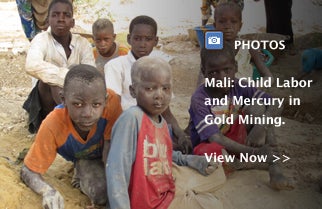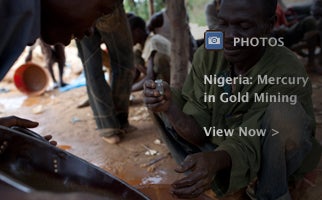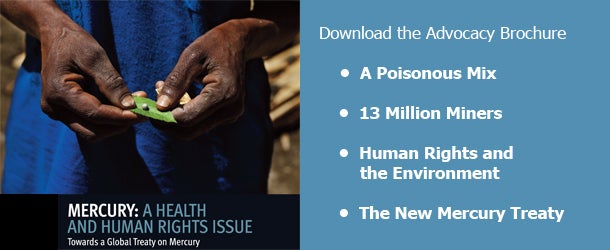Russia's Olympics in Sochi

|
The countdown to the 2014 Winter Olympic Games in Sochi, Russia, expected to be most expensive Games in history, is well under way. Russia is rapidly installing state-of-the-art winter sports venues and infrastructure on Sochi’s Black Sea Coast and in the nearby Caucasus Mountains. But the run-up to the Games has been marred by abuses against Sochi residents and workers toiling on Olympic construction. The International Olympic Committee should live up to its Olympic Charter principle on the preservation of “human dignity” and publicly press Russia to stop the abuses. It should also work to prevent similar abuses by future Olympic Games’ host cities. |
|
|
|
|
|
 Post on Facebook Post on FacebookTweet News: The Global Mercury Treaty: Japan’s Chance or Shameby Kanae Doi Webronza Mercury is an ancient metal rich in history, cloaked with mystery and power. Read More >> Mercury Convention "Must Be Brought to Life" by Juliane Kippenberg Public Service Europe This weekend, more than 140 governments agreed on the text for a new legally binding convention on mercury, a highly toxic metal. Read More >> Mercury Treaty Will Help Protect Right to Health This is the first time that an environmental treaty contains explicit action on prevention and treatment of mercury poisoning. Read More >> Take mercury out of children’s hands by Juliane Kippenberg Public Service Europe Mercury is present in many areas - such as gold mining, industrial production, coal burning and dental medicine – and therefore needs to be regulated across the globe. Read More >> Mercury Treaty: Last Chance to Address Health Effects Millions of people around the globe are exposed to mercury on a daily basis, in artisanal mining and elsewhere. There is a dire need for stronger prevention and treatment of mercury poisoning. Read More >> Take mercury out of children’s hands by Juliane Kippenberg Global Post Mercury, the silvery liquid metal, known to many from old thermometers, is one of the most toxic substances on earth. Read More >> Global Mercury Reduction Treaty: Protect Health of Gold Miners Governments from around the world recently met to negotiate an international treaty on mercury. Read Our Take >>
Publications: A Poisonous Mix: Child Labor, Mercury, and Artisanal Gold Mining in Mali“I started gold mining at a small age,” said a 15-year-old girl. “I pan for gold, I also work with mercury... I also burn it. I have never heard that this is unhealthy. I work with mercury every day.” Download the 108-Page Report Now >>
|
|
|
The Facts: Forced evictions Migrant worker abuses Press and civil society crackdown Polluting the Environment Environmental destruction
What We Want: Forced evictions: The IOC should insist that Russia stop the illegal eviction of people from their homes without adequate compensation as it builds the Olympic venues. The authorities should not sue homeowners in efforts to force them to accept lower compensation or avoid paying compensation altogether. Although unlawfully evicted property owners will never get their homes back, they should be fairly compensated. Migrant worker abuses: The IOC should insist that its partner, Olympstroy, the state company constructing Olympic venues, its subcontractors, and all other businesses engaged in Olympic construction, pay workers fully and on time and pay owed back wages. They should return workers’ passports and guarantee working hours and days off consistent with Russian law. Housing and food, when part of compensation, should meet minimum standards. Authorities should create a means for migrant workers to safely lodge complains against employers and hold abusive employers to account. Press and civil society crackdown: Thousands of Russian and foreign journalists will cover the Sochi Winter Olympics. They should be able to show the full picture of life in Russia. As required by the Olympic Charter, the IOC should insist on freedom of the press for foreign and Russian journalists alike, which is consistent with the country’s responsibility to welcome the international community as host of the Games. Environmental destruction: The IOC should insist that Russian authorities compensate and assist Sochi residents whose homes and health have been harmed by the Games’ preparations. The IOC should also push authorities to ensure all Olympics-related construction follows the law and that all companies obtain environmental and other permits. Russia should continue repairing environmental damage after the Games are over. The Olympics and Rights: Human Rights Watch’s experience documenting abuses by countries hosting the Olympic Games strongly suggests that, without solid human rights commitments and monitoring from the IOC, future host countries with dicey rights records could see similar violations in the run-up to the Games. To curb this, the IOC should publicly take a zero-tolerance stance on such abuses, including those by Russia. The IOC should also establish a standing committee to monitor Olympics-related human rights concerns and measure the impact the Games have on host countries’ human rights environments.
|
|


